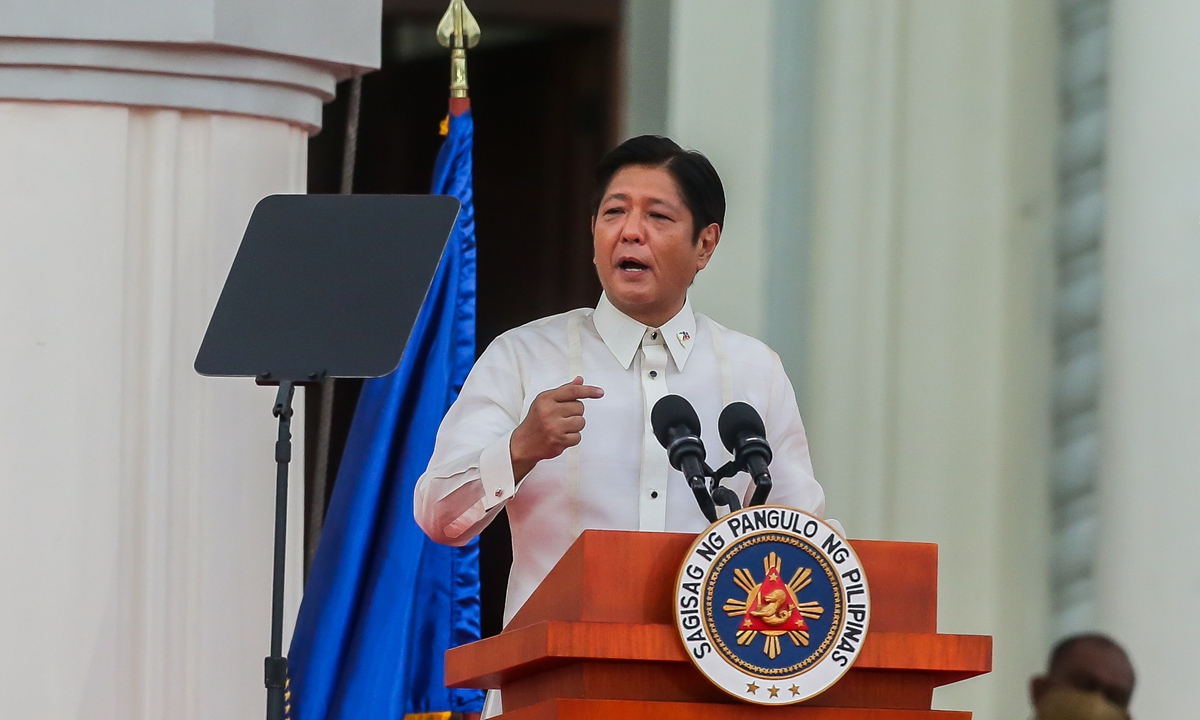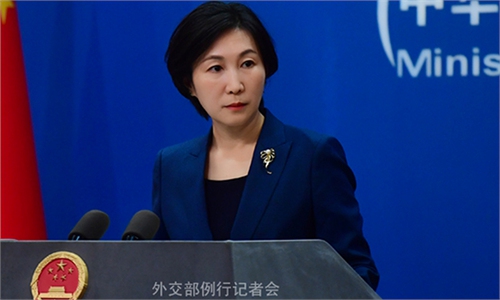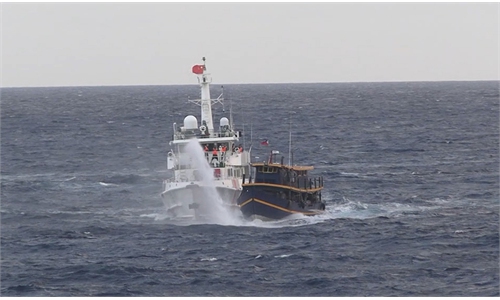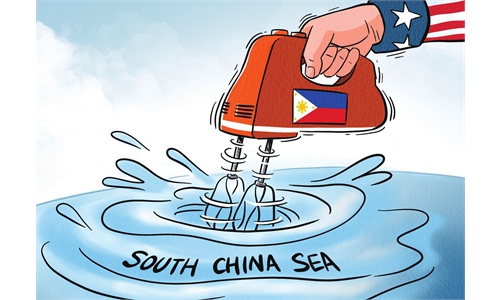
Ferdinand Romualdez Marcos, Jr. delivers his inaugural address as the 17th president of the Philippines at the National Museum in Manila in front of thousands of people on July 1, 2022. Photo:Xinhua
Philippine President Ferdinand Marcos Jr recently said in an interview with a Japanese media outlet that although the US has been assisting the Philippines in patrolling the sea lanes, the issue of the Ren'ai Jiao (Ren'ai Reef) is "a purely Filipino concern" and the Philippines intends to solve that problem itself. This statement is relatively close to the position the Chinese side has always insisted, that is, the dispute around Ren'ai Jiao is a bilateral issue between China and the Philippines. However, are the Philippine president's remarks a sign of Manila shifting away from the wrong track regarding the South China Sea issue? We hope so, but the situation still deserves further observation.
The main reason why the Philippines, contrary to how it used to behave, deliberately provoked China over the Ren'ai Jiao issue is the presence of the US. If there had been no US encouragement behind the Philippines, Manila probably wouldn't have acted so hot-headedly. From secretly giving Manila ideas to openly creating the illusion that the Philippines is under the protection of US troops, the US has allowed some forces in the Philippines to become swell-headed and has caused the greatest tension between the Philippines and China in several years around the Ren'ai Jiao. Such a state of affairs is obviously quite dangerous for the Philippines, because it has not only placed itself on the frontline of the conflict, but also become a US pawn in the Asia-Pacific, in the eyes of the world.
Marcos Jr "draws a clear line" with the US this time, which at least shows Manila's posture of hoping to maintain its autonomy and creates certain conditions for China and the Philippines to engage in dialogues and consultations to avoid more severe friction over maritime differences. It is the most basic bottom line that China and the Philippines should have the autonomy to deal with their maritime differences, and Manila needs to be quite conscious of this. Introducing extraterritorial forces will never allow the Philippines to make any gains in the Ren'ai Jiao, but will only deteriorate Manila's overall external security environment, while gradually losing its ability to dominate the direction of its own country.
The so-called "sovereignty dispute" over Ren'ai Jiao is something concocted by the Philippines. However, out of consideration for the overall situation of bilateral relations, China has maintained great patience and goodwill over the years, making maximum efforts to resolve the issue through dialogues and negotiations. This by no means implies that we will repeatedly tolerate the Philippines' malicious provocations. Many public opinions have noted that China has recently issued stern warnings to the Philippines, and given China's style of handling matters, these warnings are definitely not just for show or some kind of diplomatic rhetoric. It should be said that the signals China is sending have been received by Manila, and it is also very clear about what "hard confrontation" with China would mean for the Philippines.
Certain individuals in the US-led West and within the Philippines are creating public opinions, distorting the fundamental facts of Philippine provocation and China's compelled response into a narrative of "bullying the small by the big," attempting to stir up some kind of national sentiment within the Philippines and seek sympathy internationally. However, the logic in this narrative is full of holes. If China really wanted to engage in the "bullying the small by the big" approach, and take a tougher stance against the Philippines, there probably wouldn't be an issue with that old dilapidated warship today. The Philippines should look at its neighbors and ponder why the countries in the South China Sea region haven't expressed solidarity with it but instead maintained a distance from its impetuosity. Why do the loudest voices in support come from countries outside the region, such as the US and Japan? This issue is not difficult to understand.
The Philippines must remain vigilant against the "enthusiasm" displayed by the US and some other countries. There is no such thing as a free lunch, and behind the US' "enthusiasm" lies a hidden agenda. Disturbing the situation in the South China Sea to contain China is a key element of the US Asia-Pacific strategy, but it brings no benefits to the Philippines. China cannot be intimidated or deterred from safeguarding its rights just because Philippine vessels involved in provocations have the backing of US warships. Moreover, China will not allow the Philippines to fortify its "grounded" warship and claim China's Ren'ai Jiao as its own.
One of the worst choices for the Philippines is to verbally advocate "solving the issue on its own" while secretly harboring illusions about external forces and continuing provocations in the South China Sea. In the end, the Philippines is bound to achieve nothing and incur losses. During the phone call between the foreign ministers of China and the Philippines, the two sides agreed to hold a meeting of the Bilateral Consultation Mechanism on the South China Sea as soon as possible and create favorable conditions for it. Among the complex signals recently conveyed by the Philippines, there are glimpses of some positive changes. The sooner the Philippines returns to the right path, the smaller the cost and risks it will face.



